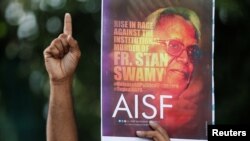The death of an 84-year-old rights activist and Jesuit priest in Mumbai has turned the spotlight on India’s tough anti-terror law, which rights activists and critics of Prime Minister Narendra Modi’s government say is being used to stifle dissent.
Stan Swamy, who was suffering from Parkinson’s disease and contracted COVID-19 while in prison, died of cardiac arrest Monday in a hospital. The oldest person to be charged with terrorism in India, he was detained for nine months without trial.
Over decades, the priest campaigned for the rights of tribal communities in Jharkhand, one of India’s most underdeveloped states. He was arrested on charges of having links to Maoist guerrillas and instigating caste-based violence in 2018, both of which he denied.
He was among 16 academics and activists arrested in connection with the case under the tough anti-terror act called the Unlawful Activities Prevention Act.
Swamy’s repeated requests for bail, which he had sought on the grounds of his poor health, were turned down since he was jailed last October. He was moved to a private hospital in late May when he became very ill.
“The bail provision is particularly stringent, so without judicial scrutiny and without trial the state is able to hold people in prison for long periods under this draconian law,” says lawyer and rights activist Vrinda Grover. “For example, the others accused in the case in which Stan Swamy was held have been behind bars without any trial, in some instances for three years now.”
In the wake of criticism following the death of the rights campaigner, India’s Foreign Ministry said Swamy’s arrest was in accordance with the law and his bail applications were rejected because of the “specific nature” of charges against him.
The comments came after human rights officials of both the European Union and the United Nations expressed concern at Swamy’s death while in pre-trial detention.
At a briefing Tuesday in Geneva, Liz Throssell, a spokeswoman for the U.N. Human Rights Commission, said the agency repeatedly urged India's government to protect a robust civil society and raised concern over the use of the anti-terror law in relation to human rights defenders.
"We are very concerned with the way he [Swamy] was treated," she said, calling for the release of people detained without proper legal basis.
Foreign Ministry Spokesman Arindam Bagchi said, “Authorities in India act against violation of the law and not against legitimate exercise of rights. India remains committed to protection and promotion of human rights of all its citizens.”
Critics in India point out that the use of the anti-terror law has been on the rise in recent years, despite extremely low conviction rates. According to data from India’s home ministry in parliament, there was an increase of more than 70% in the number of arrests made under the anti-terror law in 2019 compared with 2015.
On the other hand, conviction rates were abysmally low. According to a statement in parliament, just 2.2% of the cases registered between 2016 to 2019 led to convictions.
Rights activists charge that the anti-terror law is being used as a political weapon by the government to create a climate of fear and discourage political activism or opposition to its policies.
Meenakshi Ganguly, South Asia director of Human Rights Watch, said that it was concerning that laws like the anti-terror law are being used against peaceful critics of the government. “The counter-terror legislation is meant to keep citizens safe,” said Ganguly. “They should not be used to shut down people who disagree with government policies.”
Criticism of the use of the anti-terror law also came in from prominent newspapers in the wake of Swamy’s death. Calling it “an avoidable tragedy,” The Times of India newspaper said in an editorial, “Terror is currently too broadly defined in this draconian law” and pointed to a “more worrying trend — the freewheeling way serious charges like terrorism are being filed.”
Last month, a judge on Delhi’s High Court criticized the government while granting bail to three student activists arrested last year under the anti-terror law. They had taken part in a protest against a controversial citizenship law a day before deadly communal riots broke out in the city.
“We are constrained to express that it seems that in its anxiety to suppress dissent, in the mind of the state, the line between the constitutionally guaranteed right to protest and terrorist activity seems to be getting somewhat blurred,” the court ruled in its bail order. “If this mindset gains traction, it would be a sad day for democracy.”
Swamy championed the tribal communities legal right to land, forests and water as the mineral-rich state he lived in opened up to industrialization in the 1980s, which commentators say pitted him against powerful corporate and political interests.
At a bail hearing held in May, Swamy drew attention to his deteriorating health and said he could hardly eat or bathe without assistance.
Several commentators expressed hope that Swamy’s death will be a wake-up call to review the provisions of the law and to the judiciary, which denied him bail. “In Stan Swamy’s case for example, you have given him a sentence while you have not even demonstrated any guilt against him,” said rights activist Grover.




